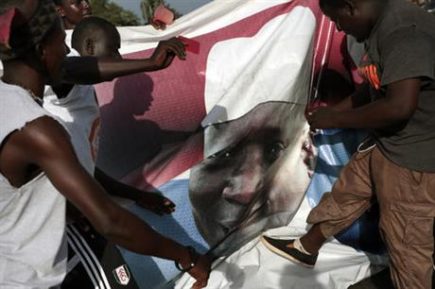Gambia leader’s hold on power ends with surprising speed
by robbie | December 3, 2016 3:45 pm

Gambians celebrate the victory of opposition coalition candidate Adama Barrow by tearing down a poster of longtime President Yahya Jammeh in the streets of Serrekunda, Gambia. (AP)
DAKAR, Senegal — In July 1994, three days after Gambia’s first president was toppled by military officers, the local Daily Observer newspaper featured a front-page photo of coup leader Yahya Jammeh under the headline: “We Will Never Introduce Dictatorship In This Country.”
In what the newspaper billed as the officers’ first post-coup interview, the men discussed the challenge of forming a government composed of “honest intellectuals.” Jammeh, then a 29-year-old lieutenant, said his plan was to step aside after three months so Gambia could hold democratic elections.
Instead, Jammeh contested and won the vote in 1996 and engineered the removal of term limits so he could stay in power indefinitely. After casting his ballot in 2011, Jammeh said that, God willing, he could rule for a billion years.
But on Friday night, almost as quickly as he came to power, Jammeh announced he was leaving. Hours after the election commission declared he had lost Thursday’s vote, state television showed footage of Jammeh placing a concession call to the winner, opposition coalition candidate Adama Barrow. Battling a spotty connection as he sat behind a desk in his trademark white robes, Jammeh said he would not challenge the result and smiled broadly when he mused about becoming a farmer in his home village.
“You are the elected president of The Gambia, and I wish you all the best,” Jammeh told Barrow. “I have no ill will.”
A tiny country of 1.9 million people surrounded almost entirely by Senegal, Gambia under Jammeh became notorious for its abysmal human rights record as well as the president’s erratic behavior.
In 2007, Jammeh claimed to have developed a cure for AIDS that involved an herbal body rub and bananas. Alarming public health experts, he insisted patients stop taking antiretroviral medications so his remedy could have an effect.
Two years later, his government rounded up nearly 1,000 people in a literal witch hunt, forcing the supposed witches to drink a hallucinogen that caused diarrhea and vomiting. The unidentified liquid led to serious kidney problems, and two people died, according to Amnesty International.
More recently, Jammeh seemed bent on exacerbating Gambia’s isolation on the world stage. In 2013 he exited the Commonwealth, a group made up mostly of former British colonies, branding it a “neo-colonial institution.” He issued increasingly virulent statements against sexual minorities, vowing to slit the throats of gay men and saying the LGBT acronym should stand for “leprosy, gonorrhea, bacteria and tuberculosis.” And in October, Jammeh said Gambia would leave the International Criminal Court, which he dismissed as the “International Caucasian Court.”
All the while, Gambia’s economy stagnated, prompting thousands to try to migrate to Europe on dangerous water routes.
Jammeh’s exit was brought about in no small part by a fed-up population, said Jeggan Grey-Johnson, a Gambian advocacy and communications coordinator for the Open Society Foundations.
Beginning in April, opposition activists staged rare protests demanding electoral reforms. Though police arrested and allegedly beat the organizers, the protests emboldened Gambians in the run-up to this week’s vote, Grey-Johnson said.
“The fear factor had been lifted,” he said. “The Gambian population was already inoculated moving forward in the sense that they could face down a dictator.”
Once voting was underway, on-the-spot counting at polling stations — a new feature for this cycle — made the process more transparent and would have complicated any attempt by Jammeh to contest his defeat, Grey-Johnson said.
“The on-the-spot counting was fundamental. I believe if there was no on-the-spot counting, that would have made a difference in the sense that there would have been an avenue for maneuvering for mischief moving forward,” he said.
The security forces who had helped Jammeh survive at least four coup attempts — most recently in December 2014 — seemed unmoved by his defeat on Friday, standing idly by as celebrating Gambians ripped down posters bearing the president’s face. It was a further sign that Jammeh had no choice but to concede, Grey-Johnson said.
“At the end of the day, he was a sitting duck and there was nothing he could do,” he said.
Reflecting on the transfer of power, Gambians said much of Jammeh’s legacy would be difficult to undo overnight. “We are conscious of the difficult task of rebuilding our country and healing our nation after 22 years of brutal tyranny,” said Pasamba Jow, a Washington-based activist.
As Gambia charts a new path, Jammeh made clear he expects this process to play out without him.
“You Gambians have decided that I should take the back seat,” he said in his televised remarks Friday night. “You have voted for somebody to lead our country. This is our country, and I wish you all the best.”
The original version of this article, reported with Abdoulie John, can be found here.
Source URL: http://robbiecoreyboulet.com/2016/12/gambia-leaders-hold-on-power-ends-with-surprising-speed/